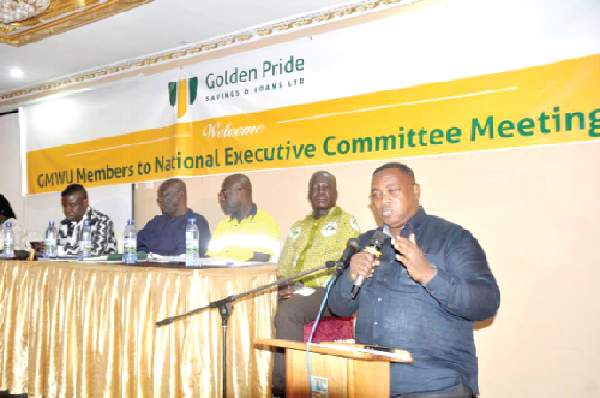
Mineworkers call for strategies to deal with non-standard forms of employment
The Ghana Mineworkers Union (GMWU) of the Ghana Trades Union Congress (TUC) has called on stakeholders in the mining industry to come out with strategies to confront the increasing trend of non-standard forms of employment (NSFE).
These include fixed term contract, casualisation and agency labour that have crept into the industry, and the union said such NSFE were of precarious nature and impacted negatively on both workers and the society.
At the mid-year National Executive Committee (NEC) meeting of the union at New Abirem in the Eastern Region, its General Secretary, Mr Prince William Ankrah, said virtually all companies had a good number of their employees engaged on fixed term basis, with some almost achieving parity between permanent and fixed term employment.
He said that was at variance with the principle of equal pay for work of equal value in the Labour Act 2003 (Act 651), and that the phenomenon had become a subject matter of intense ideological contestation between capital and labour.
Mr Ankrah said although some employers had argued that it was the most efficient labour mobility mechanism in the current competitive globalised investment environment, “we trade unionists strongly believe that it is just another neo-liberal attack to weaken unions and profiteer on workers by stealing their earnings and benefits through weak contracts and precarious arrangements,” he said.
{loadmodule mod_banners,Nativead1}
Alternative livelihoods
While reiterating its unflinching support for the elimination of illegal mining (galamsey), the union cautioned the government to prioritise the provision of alternative livelihoods for the worst affected communities, even as it clamped down on galamsey in the country.
“The current ban will undoubtedly place untold hardship on the galamsey operators with potential social consequences on the society, because galamsey provided short-lived benefits to most of the host communities,” Mr Ankrah said.
The GMWU has thus proposed the integration of some key policies such as the Mineral Development Fund, one-district, one-factory programme (1D1F) and the corporate social responsibility initiatives of multinational mining companies in the sector into a public private partnership (PPP) arrangement that can drive the development agenda of the host communities and make them meaningful.
It said with proper policy coherence, stakeholders could build a new paradigm of economic activities that would transcend mining.
Mr Ankrah commended the government for prioritising the Abboso Glass Factory and the Bonsa Tyre factory under the 1D1F, which are both located within mining enclaves, while many other economically viable buffer enterprises were exploited as part of the broader gold rush agenda.
Obuasi Mine
Mr Ankrah said the developments in AngloGold Ashanti Obuasi Mine continued to be a major source of worry to all stakeholders in the industry in view of its previous contribution to the socio-economic development of the country.
“The potential to create employment for the teeming unemployed masses as a more sustainable strategy to eliminating galamsey and its consequences on our nation cannot be underestimated. We call on the government and AngloGold Ashanti to speed up their conversation targeted at reopening the mine in order to create employment,” he said.